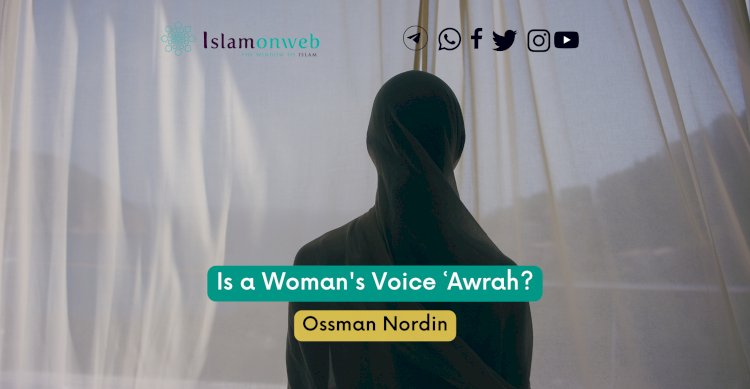Is a Woman's Voice 'Awrah'?
Introduction
The issue of women's voices in front of non-Mahram in Islam has been a source of discussion and debate in the Islamic juristic circle. Many Islamic scholars have debated whether women's voices should be heard publicly, and if so, under what circumstances. Some scholars believe that women's voices should never be heard in public, while others believe that it is permissible with certain conditions.
The concept of ʿawrah refers to the parts of the body that are considered private and should be covered. Some scholars believe that a woman's voice is part of her ʿawrah and should not be heard by men other than her immediate family. They cite some hadiths that suggest women's voices can be a source of temptation and fitna (charm, charmingness, attractiveness; enchantment exploitation) and should thus be kept private.
Other scholars, however, argue that there is no clear evidence in the Quran or hadith prohibiting women from using their voices in public. They cite examples from Islamic history in which women were known for their public speaking and poetry recitation. They also argue that because the voice is not a physical part of the body, the concept of ʿawrah does not necessarily apply to it. Let’s see the arguments of the two groups.
Two groups of Fuqaha on Voice of women
There are two schools of thought among the fuqaha' on this subject, the first viewpoint is Hanafi's; they argue that a woman's voice is ʿawrah, citing the following arguments:
وَلَا يَضْرِبْنَ بِأَرْجُلِهِنَّ لِيُعْلَمَ مَا يُخْفِينَ مِن زِينَتِهِنَّ
“And let them not stamp their feet to make known what they conceal of their adornment” (An-Nur: 31)
This prohibition demonstrates that a woman's voice is ʿawrah; if bracelets alone are prohibited, then raising one's voice is undoubtedly more affected by this prohibition. This verse, according to Imam Jashash in the Ahkamul Qur'an tafsir, shows the prohibition for women to raise their voices in conversation with men to hear them, because a woman's voice brings them closer to fitnah (Imam Jahash, 1993). As a result, the companions prohibited women from chanting the call to prayer (adhan) because it requires a high voice, which women are not permitted to do.
The second opinion is from the Shafi'i group. They argue that a woman's voice is not ʿawrah, with the following arguments:
- Women are permitted to buy and sell as well as testify in front of a judge. She must raise her voice in this case in these cases.
- When narrating the hadith, the wives of the Prophet ﷺ and his companions spoke to men. Among them was Aisha, who narrated the hadiths of Allah's Messenger to men and gave them fatwas, letting others hear her voice. Similarly, several female members of the Salahuddin al-Ayyubi family narrated hadith for men (Kholil Abu Fatih, 2012).
The ruling in listening to women's voice and its limitations
Some fuqaha' believe that listening to a woman's voice will lead to seduction and fitnah, so men should stop listening to the voices. They also have different opinions about the ruling of listening to women's voices if it is not lead to fitnah. As a result, such discussion is permissible based on the two criteria listed below:
First opinion: Hanafi, Maliki, and Syafi'i, argue that listening to women's voices is permissible and not prohibited. Because a woman's voice is not ʿawrah, it is permissible to listen to her unless it is feared that it will cause slander or a man enjoys her voice. If otherwise, men are not permitted to listen to it, even if she is reading the Al-Qur'an or humming without words that produce sound. It means the ruling changes according to man and case at the hand.
According to Ibn Abidin in his Hasyiyah, "it is permissible to discuss permissible things with non-mahram women," and he cites several fiqh experts on the subject. It's fine to talk to women who aren't interested in you, as long as you don't go on too long about things that aren't beneficial (Siti Isrofiyah. 2018).
Second opinion: it is makruh to listen to women's voices unless necessary. Because it will result in fitnah, which should be avoided. Those who hold this view belong to the Hanbali school of thought.
According to Imam Hambali's opinion on the ʿawrah of a woman's voice in prayer, it is not recommended for women to read aloud. However, reading aloud is permissible if it is not heard by strangers (non-mahrams). It is forbidden to read aloud if a stranger hears her. What is forbidden for women is to soften their conversation in order to attract men, which the Qur'an refers to as al khudhu' bil qaul (submissive, soft, alluring in speaking), as God:
يَا نِسَاءَ النَّبِيِّ لَسْتُنَّ كَأَحَدٍ مِّنَ النِّسَاءِ ۚ إِنِ اتَّقَيْتُنَّ فَلَا تَخْضَعْنَ بِالْقَوْلِ فَيَطْمَعَ الَّذِي فِي قَلْبِهِ مَرَضٌ وَقُلْنَ قَوْلًا مَّعْرُوفًا
“O wives of the Prophet, you are not like anyone among women. If you fear Allah, then do not be soft in speech [to men], lest he in whose heart is disease should covet, but speak with appropriate speech.” (Al-Ahzab: 32)
Allah forbids khudhu', which is a way of speaking that can arouse the passions of people with "sick" hearts. This is not to say that Allah forbids all women from conversing with all men. Look at the end of the surah verse above “Speak with appropriate speech”. In his tafsir fi Dhilalil Qur'an, Sayyid Qutb Rahimahullah says of this verse, “Allah forbids them when they speak to foreign men with their feminine traits” (Sayyid Quthb, 2004). Tenderness and submission, in other words, awaken male lust and inflame his libido. So that even those with diseased heart’s desire and lust after them.
Conclusion
In conclusion, the female voice is not considered as ʿawrah, women are permitted to modestly speak to anyone, keeping the etiquette of conversation and not being seductive in their voice. Women should be allowed to speak publicly if they do so in a dignified and respectful manner. Women may use their voices if they do not soften their voice in speech or singing, which may arouse men's lust. The position of those who say women’s voice is not ʿawrah is more convincing.
Major References
Al-Quran
Imam Jashash. (1993). Ahkamul Qur’an. Beirut: Dar Al fikr, Beirut
Kholil Abu Fatih. (2012). Masa’il Diniyyah. Mitra Pustaka: Jakarta
Sayyid Quthb. (2004). Fi dhilalil Qur’an, Translation: As‟ad Yasin, Jakarta,Press,
Siti Isrofiyah. (2018). Analysis of the verse regarding the prohibition of softening women's voices in qs. Al Ahzab verse 32 (comparative study of Al Misbah interpretation and Hamka interpretation) [Master dissertation, Universitas Islam Negeri Walisongo Semarang]. Universitas Islam Negeri Walisongo Semarang Research Repository. https://repository.ptiq.ac.id/id/eprint/36/1/2020-SHOFWATUNNIDA-2017.pdf
About the author
Ossman Nordinan undergraduate student of the Department of Fiqh and Usul al-Fiqh at International Islamic University (IIUM), Kuala Lumpur.
Disclaimer
The views expressed in this article are the author’s own and do not necessarily mirror Islamonweb’s editorial stance.
1 Comments
-

In this the stepping of the Feet fastly prohibited,that too only while wearing the anklets.,how could voice be related with it,when Allah can say,about the Feet clearly,how wouldn't he say about the voice clearly,without leaving into confusion,it is called textual fixing and extending more to it,it is bidah.And From other side,the historical events are full of woman talking to men and in surah Ahzab,the specific verses for Apostle's wives,it is said,"Don't talk roo gently to any one,so a Man with the bad intention would be tempted,talk in an Appopriate way". Here even in these conditions,it is not stopped,just,not to talk gently is being stopped",clear texts from Quran,about voice. So how would,one co relate the stepping down the Feet slowly while wearing anklets,be related to the voice to be Awrah.,in which stepping down fastly is prohibited so that the sound of anklets wouldn't call the attention of sounds of the Anklets,that too for diverting the attention from one's work not sexual attention,it z not a relevant argument.
























Leave A Comment